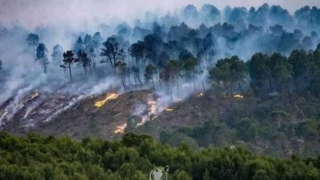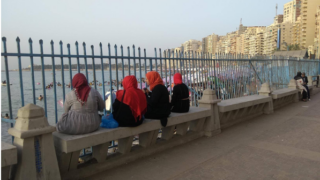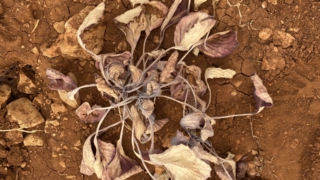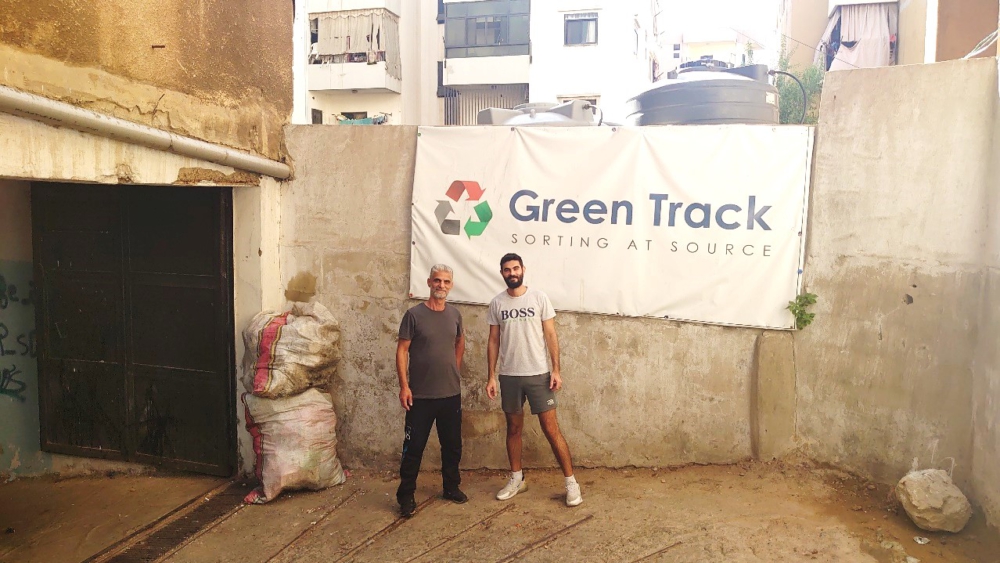
Khoder and his father in their warehouse in Tripoli. Picture taken by author
From pollution to processing: a matter of culture
The perception of waste as something ‘to get rid of’ is increasingly making place for the perception of garbage and waste as an economic possibility. Globally we are starting to understand that we need to challenge the deterioration of our health by developing a circular economic system. In the midst of these developments, it is the local conditions that determine how that transition manifests. As with every transition, this brings along a variety of cultural dilemmas. This is particularly the case in Tripoli, the second biggest city in Lebanon.
Waste that ends up in the environment or waste processed wrongfully, forms a threat to our natural environment and our public health. While nineteen percent of the plastic ends up in nature – and the production of that plastic contributes to the climate crisis – a system of transnational waste trade has developed over the last decades. In its latest discussions, the UN is figuring out how to diminish the transnational trade of waste as well as its negative effects on the pollution of our natural environment. Our technological progress has led us to understand that there are many other ways in which we can manage our waste sustainably. The assumption that waste consists out of dirty and unwanted ‘things’ that we want to get rid of, is being replaced with understanding the economic possibilities that reside in waste.
Anthropologist Mary Douglas pointed out in the 1970s that what is perceived as dirt and taboo, is a matter of cultural classification. We use cultural classification systems to cognitively organize the material world we live in. In other words: based on our culture we determine what has value in the material world. Culture thus determines what we perceive as ‘waste’, how we relate to it and how we treat it. While we are confronted with the immense task to re-value our natural environment and protect it against further pollution, our economic and cultural value systems regarding waste are changing. With the upcoming culture of ‘sustainable development’, catalyzed by the international policy frameworks of the UN Sustainable Development Goals, our material world is being re-evaluated. How that happens, depends on the local culture wherein the effects of global changes manifest.
The Lebanese waste crisis
The state of the Lebanese waste management system does not even come close to these ideas on sustainability and sustainable development. In the summer of 2015 garbage wasn’t collected for weeks in Beirut and surrounding areas. According to the citizens, who protested in the central square of Beirut against the air pollution and the meters-high garbage piles in the street, is the waste crisis a direct result of corruption and poor management of the State. They demanded the governments’ resignation and their rights to a healthy living environment.
The crisis started when the contract with Sukleen – the nationally contracted garbage management company at the time – wasn’t prolonged by the government. At the same time the government closed the largest landfill in the region, because it was far exceeding its capacity. In the following months many companies, most of them politically affiliated, offered to take care of the waste. However, they asked for such ridiculous financial compensation that none of them got a contract with the government.
The waste crisis is merely a symptom of the larger issue of corruption and poor management that characterizes the Lebanese State. Although 420 million dollar is annually spent by the government on ‘waste-management’, the effects of that investment are nowhere in sight. As a consequence of a lack of strategy, the majority of that what has been collected as waste goes unsorted – together with industrial and medical waste – to the landfills that are often meters higher than planned.
The citizens’ demands for reforms and the governments’ resignation have not been met. Their accusations regarding the corruption and poor management have been proven right; research shows that there is a culture of corruption, a lack of planning and supervision, a lack of cooperation and support and that responsibilities have been avoided within the Lebanese waste management sector. Currently, still the majority of the waste ends up in nature, is being dumped unsorted on landfills or is being burned on a large scale.
In October 2021 two Lebanese businessmen, Jihad al-Arab and Dany Khoury, were placed under sanctions by the US government because of their corrupt businesses in the waste management sector. Because of their close contacts with Lebanese politicians they were able to close million dollar contracts for waste management services. However, there was no ‘management’ whatsoever; on a large scale waste is being dumped in nature, which makes the waste crisis continue. The current government does not have the political or financial means to find new solutions. As a result, again garbage is piling up in the streets.
The deep economic crisis that has hit Lebanon over the last two years, has led to a new phase in the waste crisis. Because of the hyperinflation of the Lebanese Lira, contracts and salaries that are being paid by the government are only worth a fraction of what they used to. This results in strikes and a stop in garbage collection. The economic collapse has in its effect that the amount of people that are now searching for food and useable goods in garbage bins, has increased enormously. Men and young boys with their carts filled with collected plastic and other reusable goods have become part of the daily image in the streets and make the image of Lebanon as an underdeveloped country complete.
Tripoli – city of possibilities
In Tripoli, the second biggest city of Lebanon, this phenomenon is evident on a larger scale than anywhere else in the country. The city is known for its high poverty and food insecurity rates and has been neglected by the central government in Beirut for decades. Among most Lebanese, Tripoli is being stigmatized as an underdeveloped city that has to be avoided. However, when you look further than this stereotype image of the city, you are able to see that it is in fact the cultural values that allow for creative solutions in these contemporary challenges.
At first glance there seems to be no awareness for recycling and sustainable development in Tripoli. Like in the rest of the country, waste is being dumped in the streets and burning garbage piles are part of the daily street image. However, it is here where a small revolution is taking place. Where the Lebanese State shows herself absent, local people are taking her place to take control over their environment.
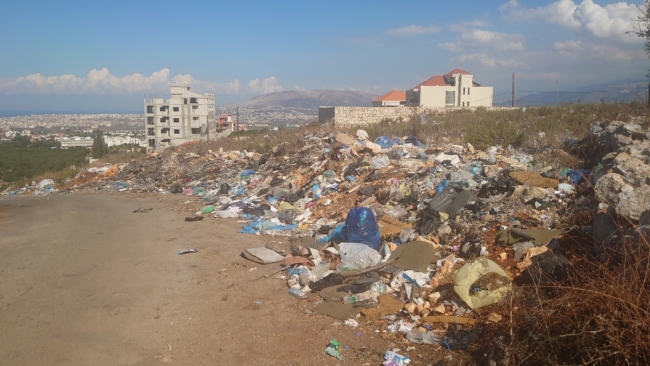
Thirty-year-old Khoder Eid is putting great effort in creating awareness on waste management in Tripoli’s neighborhoods and empowers households to sort and recycle their garbage. In 2015 he started his initiative with families in Jabal Mohsen, a neighborhood characterized by its political-sectarian war that went on for years with the neighboring area of Bab-el Tebbeneh in the northeast of the city. Nowadays, Green Track has grown and is cooperating far outside the borders of the city, to mobilize people to take responsibility in the waste crisis. I spoke with him in his warehouse in Jabal Mohsen, where he and his team collect, sort and process the collected waste. His choice to start his initiative in Tripoli, was a conscious one.
‘The focus is always on Beirut, and that is why I decided to solve the waste management problem in my own city, Tripoli. We have bad waste management because of the corruption and the culture. They collect it and dump it on the same landfill, while it is almost impossible to sort it out as soon as it ends up there. Over the last couple of years 11 billion dollars is spent on the waste problem, but we are still without any solution, while the money comes from our bank accounts and we are being left with the consequences’.
According to Khoder, sorting the waste at source before it ends up on the landfill is the only way to solve the continuing waste crisis. Despite the fact that most of the garbage ends up at the landfill just north of the city, it doesn’t mean that there is ‘management’. The municipality planned for a 12 meter high landfill, while the current landfill is 32 meters high. According to Khoder, it is a matter of time until the rest of the waste in Tripoli ends up in the streets. Even more than is already happening, that is.
The cultural process
An awareness campaign in his own neighborhood was the start of his initiative. Khoder envisions a cultural transition starting on the household level, in close cooperation with women. He motivates his mother and her friends to visit the different households and to speak with the women about how they are treating their garbage.
‘They are the ones in the kitchen, they are taking care of the food. They lead the household and are thus responsible for the waste. It is conventional for women to spend the majority of their time inside their houses, which means they are easy to find. So we started a door-to-door campaign to speak with them. We want to explain to them that these environmental, financial and public health problems, are shared problems. What they do in the kitchen has an impact on that’.
His approach turned out to be successful. A growing group of households is joining his movement to sort their waste and hand it in with Green Track. Women in the different neighborhoods, who used to be in conflict with each other, now work together in volunteering-teams to tackle the waste problem. Following on the awareness campaign Khoder now sends a team of young boys with a pick up truck to collect the sorted materials twice a week. By listening to the community, Khoder knows what it takes to manifest this cultural transition.
Women are the ones in the kitchen, they are taking care of the food. They lead the household and are thus responsible for the waste.
‘They want the push. They need someone to come and tell them what to do. They want someone handing them the tools and that they get something in return. If it is necessary to create change, I will give them what they need. If they want a garbage bag to recycle, I will give them a bag. If they want a bin to recycle, I will give them a bin. If they want someone to listen to them and to teach them, that is what we do’.
The awareness campaign mostly sorts effect in addressing women at their role in their communities. Environmental awareness and public health awareness are subjects too distant from them. Khoder is thus mainly addressing common experiences.
‘It means something to them that their neighborhood is working on this. It is because of their culture, that this is possible here. Women have the time to step outside and start talking to each other. This means something to them. It is about the feeling of doing something good. One of the women that works with my mother has no children. During the day she is free and she is spending her time meeting new people. Since she works with us, she has the feeling that she is spending her time well. During the summer, you can smell the landfill here. We use that as one of the arguments; look at that landfill and realize that is what you are smelling here. This allows us to start conversations about the consequences of poor waste management. We have to motivate them to start working on that.’
With his campaigns, Khoder introduces a form of organization that is reconcilable with the – mainly conservative Islamic – culture in Tripoli’s neighborhoods. Through building sustainable relationships with the households, repeatedly visiting the women, maintain connections through Whatsapp groups and by rewarding them every other month with products that they need, he is creating a community. At the time of writing, Khoder works in four different areas in Tripoli, next to starting different new projects and collaborations within and outside of the city. Recently, several young people from Zgharta, Minnieh, Dannieh, Koura and Bcharre have joined Green Track and as leaders for their own regions they will address the waste problem in their own communities. With this, Khoder is expanding his movement over a big part of North Lebanon.
Within Tripoli, Khoder cooperates with Georges Bitar and his Live Love Recycle program. Georges and his team developed an app and a platform – Live Love Recycle – where users can make an appointment for Georges’ team to pick up recyclables from their houses. The materials are then sorted in a warehouse and sold to the industry. Live Love Recycle is active in Beirut, Jounieh, Matn, Baabda and, Tripoli. In Tripoli, Live Love Recycle hands in the recyclables with Khoder, who takes care of them in his warehouse in Jabal Mohsen.
Georges explains that their awareness campaign is mainly happening on social media. By using Facebook, Instagram and Whatsapp they hope to reach more households and it is their wish to expand to more regions in Lebanon. However, the current crisis is limiting them significantly in that progressive thinking.
For both Georges and Khoder the increasing fuel prices and the continuing economic crisis is challenging them in meeting their goals. The costs for the collection of recyclable materials are on a continuous rise, while they are both pertinent on offering their services for free. However, at the same time they both feel that, despite the crisis and the worrying it causes on the household level, people are motivated to continue their recycling.
Khoder is motivated to stay focused on the envisioned cultural transition. ‘What matters is how we think about waste. It is not waste, they are possibilities because we can re-use it. We are now exploring how we can process the materials to create raw materials that we can sell and export. Materials that are valuable for the industry’.
In re-classifying waste into re-usable materials, Khoder adds another segment in the process of waste management; adding economic value by cleaning and shredding the material and selling it as a raw material. However, they remain dependent on the willingness of others to sort and hand in the material with Green Track. What do the people in Tripoli understand as waste and how do they relate to that? What do the people in Tripoli perceive as valuable regarding the material world?
The logic and the cultural value of the material environment
Because of the deep and large scale poverty, many are considering re-use and recycling of materials as a self-evident way of treating their material environment. According to my neighbor Nour it is absolutely taboo to throw anything away that can be re-used. Empty plastic bottles serve to germinate seeds on her balcony, seedlings which she in turn plants in empty plastic buckets. Her organic waste is being thrown in a different bucket, which serves as compost for the vegetables she is growing on her balcony, because the continuous rising food prices are threatening the amount of food she can buy for her family. This does not have so much to do with environmental awareness or public health, but is simply a coping strategy for financial means. Everything that can be re-used, is re-used.
Nour’s logic is illustrative for Tripoli’s culture. A culture where a local circular economy and the economic value of ‘waste’ is a self-evident part of. Khoder shows us that understanding and connecting with the local reality and culture is a factor of success in the transition to sustainable thinking and creating a circular economy. Instead of perceiving Tripoli as a mere poor, conservative city, she has proven herself as a city where the elements of the existing culture allows possibilities to start a movement towards a circular economic system that can contribute to achieving the Sustainable Development Goals. People like Khoder and Georges are introducing a new form of organization, but the circumstances and the logic itself are already there.
Share this post via
